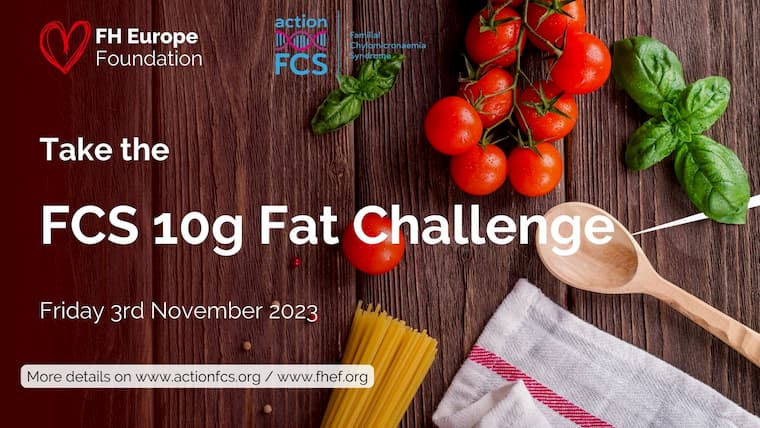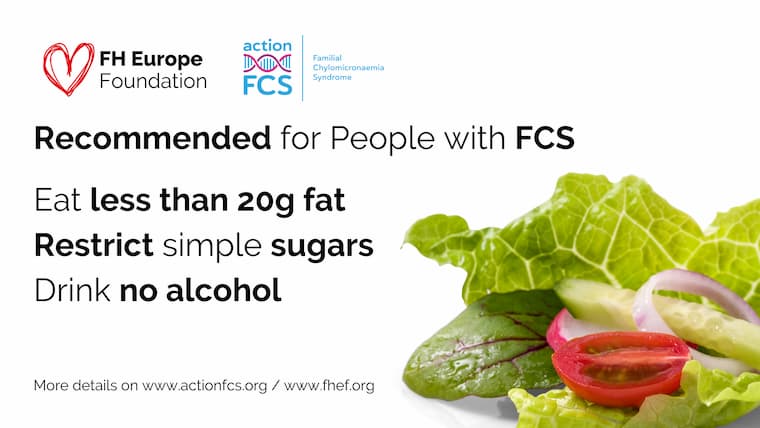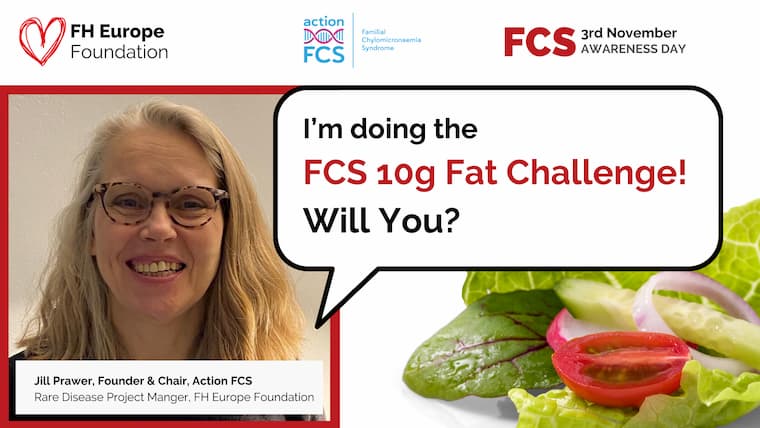
The first Friday of November is Familial Chylomicronaemia Syndrome (FCS) Awareness Day, this year on 3rd November. This year we are delighted to be working in partnership with our UK-based network member, Action FCS, to raise awareness of FCS, and to amplify the under-estimated impact that living with the condition has on the lives of patients and those around them. We’re asking you to share in the challenge that many people with FCS face daily, attempting to live in a world, that literally, doesn’t cater for them!
People with FCS have inherited faulty gene variants which affect the function of a protein called lipoprotein lipase (LPL) needed for breaking down dietary fat. In some people with FCS, the genetic variants affect LPL directly and in others the genetic variants affect the function of another protein required to make LPL work effectively.
When fat is eaten in the diet it enters the bloodstream as triglycerides. Triglycerides are parcelled up with proteins into chylomicrons which are then broken down by LPL. People with FCS lack functioning LPL and cannot dispose of chylomicrons which remain in the blood and are responsible for its milky-white appearance. Chylomicrons circulate in the bloodstream and block small blood vessels in multiple organs which is thought to be how they cause the symptoms associated with FCS including abdominal pain which can be severe, and pancreatitis which can be life-threatening. Read more about FCS here and on the our news page.

To reduce the risk of pain and pancreatitis, patients are recommended to eat a diet of less than 20g of fat per day, avoid added sugars and drink no alcohol. The 20g fat limit includes both animal and vegetable fat, and fat found within food as well as added to food. For many patients, 20g fat is too high and still leaves them at risk of pancreatitis and they may only be able to eat about 10g fat a day. They need to supplement their diet with a medically prescribed oil called MCT oil (medium chain triglycerides), however, this is not available to all patients and is difficult to cook with.
Join FCS patients and eat only 10g fat over the whole day and help to raise awareness by making a video or photo diary recording the progress of your day and tag @fhpatienteurope and @ActionFCS using hashtags. #FCS10gFatChallenge #FCSAware2023 to help us to bring attention to this rare and under-diagnosed condition.
Commit to doing the challenge by sending your photo to us to share on social media.

We’ll send you a template of a suggested email to help you to nominate others
Contact jill@fheurope.org for suggestions on making your record of the day for social media and to have your photo put into a frame
The 10g of fat per day means all fats from any source – you will find dietary guidelines here. You may be surprised by how quickly your fat total adds up!
Calculating the amount of fat that you eat is usually a matter of mental maths.
You will find lots of information and general guidance here https://www.actionfcs.org/support/ including, on the resources page, a webinar led by dietitian Sarah Firmin from Guys and St Thomas’s Hospital in London, England who gives a thorough explanation of nutritional needs for people with FCS https://youtube.com/watch?v=YKfNe2OHAdI
We hope you will take the challenge and have fun doing so, whilst also raising awareness of this rare and underdiagnosed condition.
Good luck!